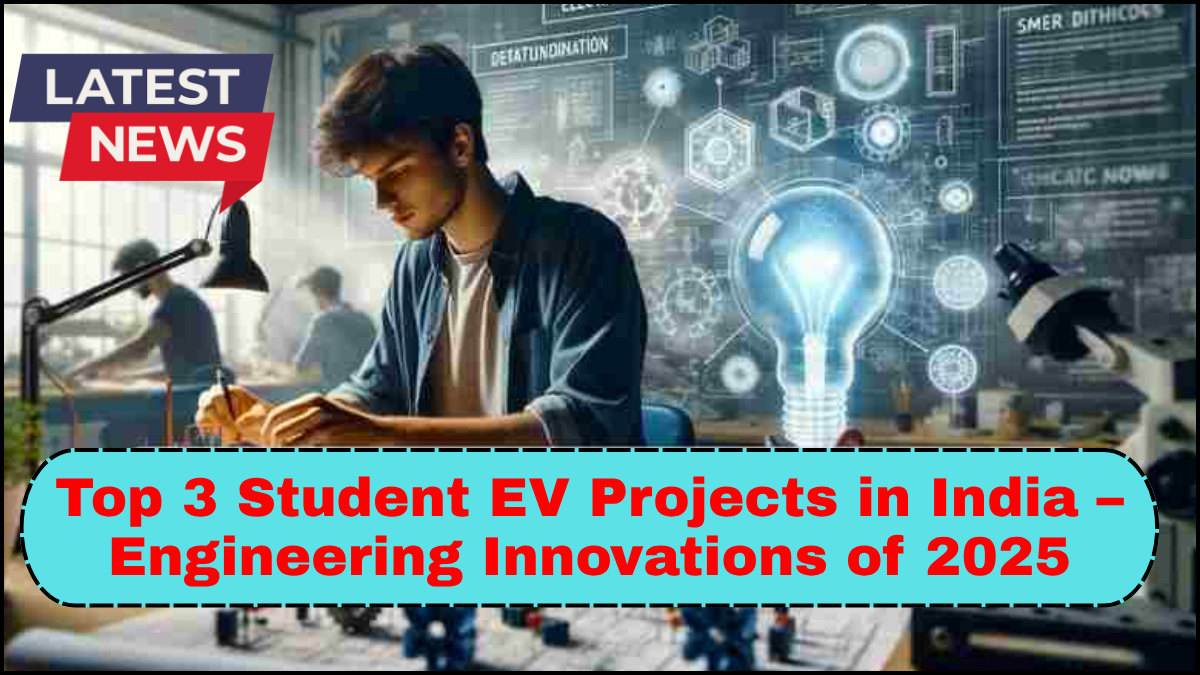The rise of electric vehicles (EVs) isn’t limited to industry giants. Across India’s top engineering institutes, students are driving innovation with high-impact EV projects that rival professional prototypes. These Student EV Projects are more than academic exercises; they are real-world solutions shaped by cutting-edge engineering ideas that tackle sustainability, cost-efficiency, and performance. In 2025, three standout projects have emerged, showcasing the future of Indian automotive innovation.

1. IIT Madras – Hyperloop-Inspired EV Pod (Project Praana)
The team at IIT Madras has taken a bold step beyond traditional EV architecture. Project Praana is a single-seater urban pod designed for smart city commutes, drawing inspiration from Hyperloop dynamics.
- Core Engineering Innovation: The EV utilizes a magnetic levitation-assisted drivetrain to reduce friction and power loss, significantly increasing energy efficiency.
- Lightweight Materials: The body is constructed from carbon fiber-reinforced polymer, making it ultra-light yet durable.
- Smart Grid Integration: The vehicle includes onboard diagnostics and can automatically connect to smart grids for optimized charging.
- Eco-focus: Designed to function with solar-powered charging stations, making it ideal for future-ready green cities.
Impact: Project Praana positions itself as a prototype for personal mobility in dense urban environments. It balances speed, safety, and sustainability—a triad rarely achieved in current commercial EVs.
2. BITS Pilani – Modular EV Platform for Rural Mobility (Project Gram-EV)
At BITS Pilani, innovation takes a socially conscious turn. Project Gram-EV addresses a major gap: reliable and affordable electric mobility for India’s rural and semi-urban regions.
- Flexible Architecture: The platform supports interchangeable modules—from two-wheelers to small cargo vehicles—allowing scalability and adaptability.
- Battery Swapping: The use of standardized battery packs enables quick swapping, solving long charging time issues in areas with limited infrastructure.
- Cost Optimization: Developed using locally sourced components to keep the price point accessible without compromising quality.
- AI-Driven Diagnostics: The onboard system predicts faults and offers preventive maintenance suggestions via a mobile app.
Impact: Gram-EV could redefine last-mile connectivity, offering a sustainable and economical alternative to fuel-powered options in underdeveloped regions.
3. Delhi Technological University (DTU) – Formula Electric Race Car (Project Volt-X)
DTU’s Volt-X is built for the track but designed to influence road EVs. This student-led Formula Electric race car demonstrates the peak of student-driven performance engineering.
- High-Efficiency Motor Control: Custom-built motor controllers deliver optimized torque distribution for performance racing.
- Regenerative Braking: Energy recovery during braking enhances battery life and efficiency.
- Advanced Telemetry: Real-time data analytics help in fine-tuning vehicle parameters mid-race.
- Aerodynamic Design: CFD-optimized body shape significantly reduces drag, increasing top speeds and stability.
Impact: Volt-X isn’t just a racing machine—it’s a testbed for future commercial EV technologies, offering insights into powertrain optimization, material science, and electric safety systems.
Why These Student EV Projects Matter
These top Student EV Projects highlight the blend of technical expertise, innovation, and purpose-driven design that defines the new wave of engineering in India. They’re not just student achievements; they’re tangible blueprints for industry transformation.
Each project introduces pioneering engineering ideas in EV design, from AI diagnostics and modular platforms to lightweight composites and performance telemetry. These innovations, driven by India’s next-gen engineers, are carving a space for student-led progress in the global EV revolution.
Frequently Asked Questions (FAQ)
Q1: What makes a student EV project stand out?
A standout project demonstrates originality, real-world applicability, sustainable design, and innovative engineering solutions.
Q2: Are these student EV projects supported by industry?
Yes, many top institutes collaborate with automotive companies for funding, mentoring, and technical support.
Q3: Can these student innovations influence commercial EVs?
Absolutely. Several components and design principles from student projects are already being tested in commercial prototypes.
Q4: How can students get involved in EV projects?
Joining campus clubs like SAE or Formula Student teams, applying for research internships, and participating in national competitions like eBAJA or EFFI-Cycle are excellent entry points.
click here to learn more